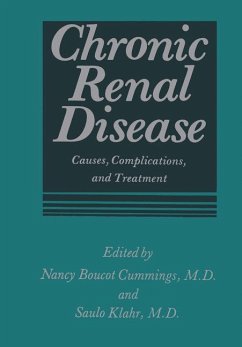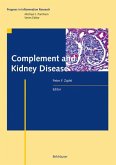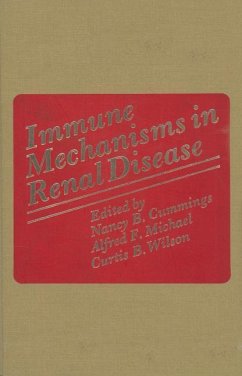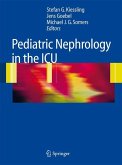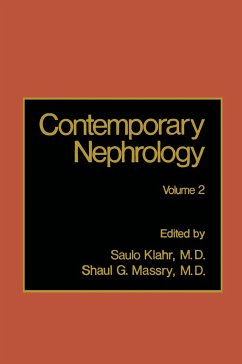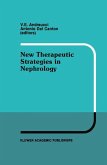- Broschiertes Buch
- Merkliste
- Auf die Merkliste
- Bewerten Bewerten
- Teilen
- Produkt teilen
- Produkterinnerung
- Produkterinnerung
Chronic renal disease has received increasing attention and concern since the passage in 1972 of PL 92-603, which provided coverage for end-stage renal disease (ESRD) treatment by the federal government. The human and economic costs of the ESRD program serve to emphasize the need to prevent or to arrest those diseases resulting in chronic renal failure, since none of the available treatments is without complications and/or side effects. The ESRD program, the only federal one that provides coverage for a catastrophic illness for almost the entire population (those qualifying under Social…mehr
Andere Kunden interessierten sich auch für
![Complement and Kidney Disease Complement and Kidney Disease]() Peter F. ZipfelComplement and Kidney Disease121,99 €
Peter F. ZipfelComplement and Kidney Disease121,99 €![Immune Mechanisms in Renal Disease Immune Mechanisms in Renal Disease]() Immune Mechanisms in Renal Disease81,99 €
Immune Mechanisms in Renal Disease81,99 €![Paediatric Nephrology Paediatric Nephrology]() Paediatric Nephrology81,99 €
Paediatric Nephrology81,99 €![Pediatric Nephrology in the ICU Pediatric Nephrology in the ICU]() Stefan G. Kiessling / Jens Goebel / Michael J.G. Somers (eds.)Pediatric Nephrology in the ICU112,99 €
Stefan G. Kiessling / Jens Goebel / Michael J.G. Somers (eds.)Pediatric Nephrology in the ICU112,99 €![Electron Microscopy of the Kidney Electron Microscopy of the Kidney]() Anil K. MandalElectron Microscopy of the Kidney105,99 €
Anil K. MandalElectron Microscopy of the Kidney105,99 €![Contemporary Nephrology Contemporary Nephrology]() Contemporary Nephrology42,99 €
Contemporary Nephrology42,99 €![New Therapeutic Strategies in Nephrology New Therapeutic Strategies in Nephrology]() New Therapeutic Strategies in Nephrology242,99 €
New Therapeutic Strategies in Nephrology242,99 €-
-
-
Chronic renal disease has received increasing attention and concern since the passage in 1972 of PL 92-603, which provided coverage for end-stage renal disease (ESRD) treatment by the federal government. The human and economic costs of the ESRD program serve to emphasize the need to prevent or to arrest those diseases resulting in chronic renal failure, since none of the available treatments is without complications and/or side effects. The ESRD program, the only federal one that provides coverage for a catastrophic illness for almost the entire population (those qualifying under Social Security), cost almost $2 billion in 1983. The escalating costs of the ESRD program are attributed to the increasing number of patients requiring treatment and have focused concerns of the United States Government, both Congress and the administration, on ESRD. The National Institutes of Health (NIH), especially the Kidney, Urology, and Hematology Division of the National Institutes of Arthritis, Diabetes, and Digestive and Kidney Diseases (NIADDK), supports a sizable research program that bears on chronic renal disease and in association with this has sponsored many conferences and workshops on research on and causes and complications of chronic renal failure. This book is an outgrowth of the issues addressed by participants at a number of NIH conferences held in the 1980s.
Hinweis: Dieser Artikel kann nur an eine deutsche Lieferadresse ausgeliefert werden.
Hinweis: Dieser Artikel kann nur an eine deutsche Lieferadresse ausgeliefert werden.
Produktdetails
- Produktdetails
- Verlag: Springer / Springer US / Springer, Berlin
- Artikelnr. des Verlages: 978-1-4684-4828-3
- Softcover reprint of the original 1st ed. 1985
- Seitenzahl: 624
- Erscheinungstermin: 2. April 2012
- Englisch
- Abmessung: 244mm x 170mm x 34mm
- Gewicht: 1060g
- ISBN-13: 9781468448283
- ISBN-10: 1468448285
- Artikelnr.: 39497870
- Herstellerkennzeichnung Die Herstellerinformationen sind derzeit nicht verfügbar.
- Verlag: Springer / Springer US / Springer, Berlin
- Artikelnr. des Verlages: 978-1-4684-4828-3
- Softcover reprint of the original 1st ed. 1985
- Seitenzahl: 624
- Erscheinungstermin: 2. April 2012
- Englisch
- Abmessung: 244mm x 170mm x 34mm
- Gewicht: 1060g
- ISBN-13: 9781468448283
- ISBN-10: 1468448285
- Artikelnr.: 39497870
- Herstellerkennzeichnung Die Herstellerinformationen sind derzeit nicht verfügbar.
I. Studies of Pathogenesis of Renal Disease: Research Trends in Glomerular Diseases.- 1 A Personal Perspective on the State of the Art in Research in Glomerulonephritis.- 2 Biosynthesis and Immunochemical Localization of Glomerular Components.- 3 The Role of Fixed (Native) and Planted Antigens in Glomerular Disease.- 4 Deposition of Circulating Immune Complexes in Glomeruli.- Cystic Diseases of the Kidney.- 5 Renal Cystic Disease as the Target of Research.- 6 Morphology of Human Renal Cystic Disease.- 7 Morphology of Polycystic Kidney Disease in Man and Experimental Models.- 8 Ordered and Disordered Growth of Renal Cells.- 9 Movements of Salts and Water into Cysts in Polycystic Kidney Disease.- 10 Movement of Organic Molecules into Cysts.- 11 Kinetics of Cyst Development in Cystic Renal Disease.- 12 Early Polycystic Kidney Disease.- II. Recent Advances on Some Complications of Chronic Renal Failure: Renal Osteodystrophy, Vitamin D Analogues, Parathormone.- 13 An Overview of Recent Advances in Mineral Metabolism.- 14 The Pathology of the Uremic Bone Lesion.- 15 Vitamin D Metabolism in Chronic Renal Disease.- 16 Metabolism of Parathyroid Hormone and Interpretation of Radioimmunoassays for PTH.- 17 Collagen Metabolism in Uremia.- Neurologic Complications of Renal Failure.- 18 Neurologic Complications of Renal Failure: The State of the Art.- 19 Dialysis Encephalopathy: Questions and Answers.- 20 Uremic Neuropathy.- Cardiovascular Complications of Renal Failure.- 21 Cardiovascular Complications in End-Stage Renal Disease Patients.- 22 Renal Function, Sodium, Volume, and Arterial Pressure Relationships.- 23 Abnormal Carbohydrate and Lipoprotein Metabolism in Uremia: Possible Relationship to Atherogenesis.- 24 The Role of Blood Pressure Regulation in Uremia.- 25 The Role of Manipulating Lipids in Uremia.- 26 Coronary Artery Disease in Diabetic Patients with End-Stage Renal Disease.- 27 Indicators for Cardiovascular Catastrophe in Diabetic Patients with Renal Failure.- III. Unique Problems of the Child with Renal Failure.- 28 The Child with Renal Failure: An Overview.- 29 Prevention of Renal Damage by Early Recognition of Urinary Tract Infections in Childhood.- 30 Nutritional Requirements for Growth in Children with Renal Insufficiency.- 31 Protein Utilization in Chronic Renal Insufficiency in Children.- 32 Renal Osteodystrophy in Children.- 33 Renal Transplantation in Children Aged 1-5 Years: Review of the University of Minnesota Experience.- 34 Experience with End-Stage Renal Disease Treatment of Young Children: A Brief Note.- 35 The European Experience with Treatment of End-Stage Renal Disease in Young Children.- 36 Prognosis of Renal Disease in Infancy.- IV. Selected Aspects of Therapy: Drugs and Renal Failure and Acute Problems during Hemodialysis.- 37 Drug-Induced Nephrotoxicity.- 38 Antibiotic Management of Urinary Tract Infection in the Chronic Renal Failure Patient.- 39 Contrast Media Acute Renal Failure.- 40 Effect of Renal Disease on Pharmacokinetics and Bioavailability.- 41 Pathogenesis of Aminoglycoside Nephrotoxicity.- 42 Acute Problems during Hemodialysis.- Control of Treatment Morbidity and Uremic Toxicity with Hemodialysis and Hemofiltration Therapy.- 43 The Role of Net Na and H2OFlux in the Morbidity of Hemodialysis and Hemofiltration.- 44 The Role of Small-Molecule Removal in the Control of Treatment Morbidity with Hemodialysis and Hemofiltration.- 45 The Role of Membrane Biocompatibility on the Clinical Effects of Hemodialysis Therapy.- 46 Comparative Physiology of Acetate and Bicarbonate Alkalinization.- Transplantation and Immunosuppression.- 47 The State of the Art.- 48 Use of Total Lymphoid Irradiation in Organ Transplantation.- 49 Total Lymphoid Irradiation for Immunosuppression: Review of Animal Experiments and Results of a Clinical Trial in Renal Allograft Recipients.- 50 Cyclosporin A as an Immunosuppressive Agent in Transplantation.- 51 The Pretreatment Principle in Renal Transplantation as Illustrated by Thoracic Duct Drainage.- 52 Thoracic Duct Drainage: Clinical Experience.- 53 Current Status of Induction of Specific Unresponsiveness to Organ Allografts.- 54 Immunogenetics of HLA.- Nutritional Therapy in Chronic Renal Failure.- 55 Some Questions of a Clinical Nephrologist Concerning Nutritional Therapy and Patients with Chronic Renal Failure.- 56 The Loss of Renal Enzymes: A Risk Factor for Nutritional and Metabolic Disorders.- 57 Can Low-Protein Diet Retard the Progression of Chronic Renal Failure?.- 58 Evaluation of Amino Acid Requirements in Uremia by Determination of Intracellular Free-Amino-Acid Concentrations in Muscle.- 59 Nutritional Management of Chronic Renal Failure for Two Purposes: Postponing Onset and Reducing Frequency of Dialysis.- 60 A Progressive Encephalopathy in Children with Renal Failure in Infancy.- Contributors.
I. Studies of Pathogenesis of Renal Disease: Research Trends in Glomerular Diseases.- 1 A Personal Perspective on the State of the Art in Research in Glomerulonephritis.- 2 Biosynthesis and Immunochemical Localization of Glomerular Components.- 3 The Role of Fixed (Native) and Planted Antigens in Glomerular Disease.- 4 Deposition of Circulating Immune Complexes in Glomeruli.- Cystic Diseases of the Kidney.- 5 Renal Cystic Disease as the Target of Research.- 6 Morphology of Human Renal Cystic Disease.- 7 Morphology of Polycystic Kidney Disease in Man and Experimental Models.- 8 Ordered and Disordered Growth of Renal Cells.- 9 Movements of Salts and Water into Cysts in Polycystic Kidney Disease.- 10 Movement of Organic Molecules into Cysts.- 11 Kinetics of Cyst Development in Cystic Renal Disease.- 12 Early Polycystic Kidney Disease.- II. Recent Advances on Some Complications of Chronic Renal Failure: Renal Osteodystrophy, Vitamin D Analogues, Parathormone.- 13 An Overview of Recent Advances in Mineral Metabolism.- 14 The Pathology of the Uremic Bone Lesion.- 15 Vitamin D Metabolism in Chronic Renal Disease.- 16 Metabolism of Parathyroid Hormone and Interpretation of Radioimmunoassays for PTH.- 17 Collagen Metabolism in Uremia.- Neurologic Complications of Renal Failure.- 18 Neurologic Complications of Renal Failure: The State of the Art.- 19 Dialysis Encephalopathy: Questions and Answers.- 20 Uremic Neuropathy.- Cardiovascular Complications of Renal Failure.- 21 Cardiovascular Complications in End-Stage Renal Disease Patients.- 22 Renal Function, Sodium, Volume, and Arterial Pressure Relationships.- 23 Abnormal Carbohydrate and Lipoprotein Metabolism in Uremia: Possible Relationship to Atherogenesis.- 24 The Role of Blood Pressure Regulation in Uremia.- 25 The Role of Manipulating Lipids in Uremia.- 26 Coronary Artery Disease in Diabetic Patients with End-Stage Renal Disease.- 27 Indicators for Cardiovascular Catastrophe in Diabetic Patients with Renal Failure.- III. Unique Problems of the Child with Renal Failure.- 28 The Child with Renal Failure: An Overview.- 29 Prevention of Renal Damage by Early Recognition of Urinary Tract Infections in Childhood.- 30 Nutritional Requirements for Growth in Children with Renal Insufficiency.- 31 Protein Utilization in Chronic Renal Insufficiency in Children.- 32 Renal Osteodystrophy in Children.- 33 Renal Transplantation in Children Aged 1-5 Years: Review of the University of Minnesota Experience.- 34 Experience with End-Stage Renal Disease Treatment of Young Children: A Brief Note.- 35 The European Experience with Treatment of End-Stage Renal Disease in Young Children.- 36 Prognosis of Renal Disease in Infancy.- IV. Selected Aspects of Therapy: Drugs and Renal Failure and Acute Problems during Hemodialysis.- 37 Drug-Induced Nephrotoxicity.- 38 Antibiotic Management of Urinary Tract Infection in the Chronic Renal Failure Patient.- 39 Contrast Media Acute Renal Failure.- 40 Effect of Renal Disease on Pharmacokinetics and Bioavailability.- 41 Pathogenesis of Aminoglycoside Nephrotoxicity.- 42 Acute Problems during Hemodialysis.- Control of Treatment Morbidity and Uremic Toxicity with Hemodialysis and Hemofiltration Therapy.- 43 The Role of Net Na and H2OFlux in the Morbidity of Hemodialysis and Hemofiltration.- 44 The Role of Small-Molecule Removal in the Control of Treatment Morbidity with Hemodialysis and Hemofiltration.- 45 The Role of Membrane Biocompatibility on the Clinical Effects of Hemodialysis Therapy.- 46 Comparative Physiology of Acetate and Bicarbonate Alkalinization.- Transplantation and Immunosuppression.- 47 The State of the Art.- 48 Use of Total Lymphoid Irradiation in Organ Transplantation.- 49 Total Lymphoid Irradiation for Immunosuppression: Review of Animal Experiments and Results of a Clinical Trial in Renal Allograft Recipients.- 50 Cyclosporin A as an Immunosuppressive Agent in Transplantation.- 51 The Pretreatment Principle in Renal Transplantation as Illustrated by Thoracic Duct Drainage.- 52 Thoracic Duct Drainage: Clinical Experience.- 53 Current Status of Induction of Specific Unresponsiveness to Organ Allografts.- 54 Immunogenetics of HLA.- Nutritional Therapy in Chronic Renal Failure.- 55 Some Questions of a Clinical Nephrologist Concerning Nutritional Therapy and Patients with Chronic Renal Failure.- 56 The Loss of Renal Enzymes: A Risk Factor for Nutritional and Metabolic Disorders.- 57 Can Low-Protein Diet Retard the Progression of Chronic Renal Failure?.- 58 Evaluation of Amino Acid Requirements in Uremia by Determination of Intracellular Free-Amino-Acid Concentrations in Muscle.- 59 Nutritional Management of Chronic Renal Failure for Two Purposes: Postponing Onset and Reducing Frequency of Dialysis.- 60 A Progressive Encephalopathy in Children with Renal Failure in Infancy.- Contributors.

